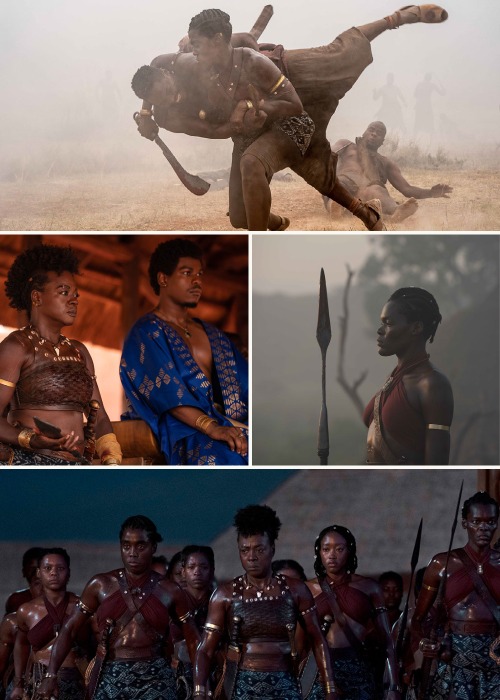 THE WOMAN KING, US, 2022. Starring Viola Davis, Thusa Mbedu, Lashana Lynch, Sheila Atim, John Boyega, Hero Fiennes Tiffin, John Boyega, Jordan Bolger, Jimmy Odukoyo, Jayme Lawson. Directed by Gina Prince-Bythewood. 135 minutes. Rated M (Mature themes and battle violence,)
THE WOMAN KING, US, 2022. Starring Viola Davis, Thusa Mbedu, Lashana Lynch, Sheila Atim, John Boyega, Hero Fiennes Tiffin, John Boyega, Jordan Bolger, Jimmy Odukoyo, Jayme Lawson. Directed by Gina Prince-Bythewood. 135 minutes. Rated M (Mature themes and battle violence,)
Advertising and trailers seem to suggest that this is an African adventure in the Marvel Universe tradition of Black Panther. It is, in fact, a historical drama, set in 1823 in the West African territory of Dahomey, now part of the country of Benin.
Dahomey is presented as a prospering country, the opening of the film giving a historical context, the various tribes and nations surrounding it, hostilities. And, one of the key issues, is the African slave trade, the African rulers themselves negotiating with the British and, here, slave traders from Brazil. (In 10 years time, 1833, Britain will abolish slavery.).
Warfare is part of the culture. The film opens with a raid, fight and massacre, setting a tone for what is to happen. But, what is different, is that the leader of the raid is a woman warrior, Nanisca (Davis), a fierce, determined leader. And, she is at the service of the young king, more open-minded, interested in trade in palm oil, wary of the slave trade. He is played with some dignity and wisdom by Boyega.
For two centuries, the female warriors, the Agojie, have been defenders of the kingdom. Nanisca has spent her adult life training the warriors, there are quite a number of scenes of training, physical and psychological demands, the self-sacrifice of the women not marrying and committing completely to the Agojie, and severe physical tests of their prowess. Later, there will be some emotional investment in Nanisca as something is revealed of her early life. Davis, who has portrayed over decades in films and on television, an extraordinary range of characters is in command here, ultimately recognised for her leadership, becoming a woman king.
But, there is the next generation, especially the orphan, Nawi (South African actress Mbeda), refusing an arranged marriage, abandoned by her father, but finding her home, companionship, ideals, in becoming a champion Agojie.
The film also shows the slave traders, their ruthlessness, embodied in a young Portuguese entrepreneur, played by Hero Fiennes Tiffin, but a humane aspect in his friend, Malik, Brazilian father, slave mother from Dahomey, who is in search of his African heritage – and, as might be expected, encounters Nawi, a testing of her commitment to the Agojie.
The action builds up to a confrontation between the Agojie and the Dahomey warrior men, hand-to-hand combat, violent war sequences.
Audiences may be thinking that this is the climax to the story, the action, but, there are more complexities, Nawi taken prisoner, the role of the slave traders, Nanisca and her decision to raze the slave trading town.
In some ways, the action resembles the African sequences and action from a Marvel movie which, as we watch, in some way diminishes the intended overall impact, the serious look at an African nation in the 19th century, the role of the protecting women warriors, the King, military leadership, and the impact of the slave trade and the rising up against it.
Sony
Released 27 October